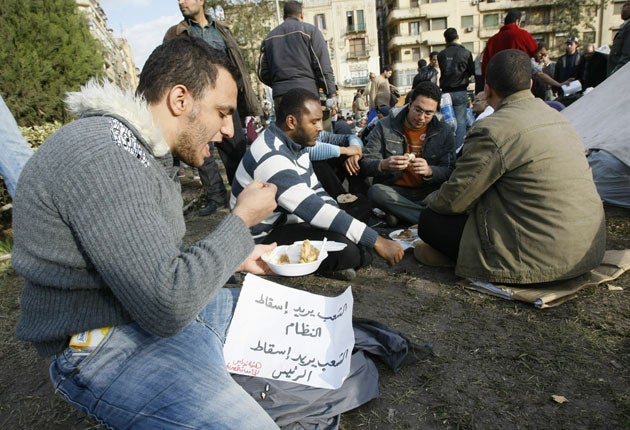We're here to protect you, not to threaten you, Army tells protesters

In what could prove a critical moment in Egypt's popular uprising against Hosni Mubarak, the country's army last night told demonstrators that their demands were "legitimate" and that troops "would not resort to the use of force against our great people".
On the eve of a planned demonstration that could bring as many as a million protesters to the streets, the army's statement, carried on state television, appeared to mark a significant blow to Mr Mubarak's hopes of clinging to power.
"The presence of the army in the streets is for your sake and to ensure your safety and wellbeing," the statement said. "Your armed forces, who... are keen to assume their responsibility in protecting the nation and its citizens, affirm that freedom of expression through peaceful means is guaranteed to everybody."
Today's protests will prove a crucial test of the army's commitment, which, if it were matched by its actions, could consign President Mubarak to history. Without the support of the widely respected army, which has been an imposing presence on the streets of Cairo in recent days, his chances of seeing off the uprising appear remote. Yesterday he attempted once more to stem the tide against him by appointing a new cabinet and ordered talks to begin with "political forces" for constitutional reforms demanded by the protesters. Opposition forces have long demanded a lifting of strict restrictions on who is eligible to run for president to allow a real challenge to the ruling party.
The new ministers – including a replacement for the widely feared and heavily criticised Interior Minister – were sworn in as tens of thousands again thronged Tahrir Square in central Cairo in defiance of a declared 3pm curfew on a seventh successive day of protests.
Despite the heavy army presence in the square and at nearby intersections – and with the exception of a tense incident in the late morning when troops started firing in the air – relations between troops and demonstrators throughout the daylight hours were calm and even cordial compared with the crowd's universal contempt for police who tried to quell the protests with lethal brutality last week.
Metres from the tanks in the northwest corner of the square as a military helicopter repeatedly circled low above the crowd, the secondary schoolEnglish teacher Ahmed Mutawa, 45, declared: "We like the army very much. The army is us, it is Egypt, it is my students."
The authorities meanwhile detained six journalists working for the TV satellite channel Al Jazeera's English service. The channel said the journalists had been released after about two hours but that some camera equipment had not been returned to the station.
The authorities' extreme sensitivity to blanket media coverage of the protests was underlined not only by the Al Jazeera arrests but also by a large protective cordon of tanks and army personnel around the headquarters of Egyptian state TV, rather than the protests themselves.
In parts of the city citizen vigilantes manned checkpoints designed to curb looting, which has broken out since the withdrawal of police from the streets after Friday's lethal crackdown.
But at Tahrir Square, which has become the symbolic centre of the protests, many thousands continued to stream past a group of tanks into the square, many chanting "Fall, Fall, Mubarak" and "The regime must fall".
Among the protesters, the hospital anaesthetist Tamer Al Masri, 32, a father of two young children, said: "How can I have any hope for my children if I earn 700 [Egyptian] pounds (£73) a month, out of which I have to find 150 for electricity and 110 in taxes?
"The government schools are so bad and they should be in private school but I can't afford it."
Suzanne Saleh, a British-educated 38-year-old mother of three, said that assumptions that the Muslim Brotherhood would win free elections were "just political propaganda for the West". She added: "I don't care who leads Egypt – Muslim, Christian or even Jewish – if he has the right strategy for the country."
Yet it was unclear how long the present stand-off between the authorities and the demonstrators could continue without the President's fall or the wholesale crackdown which the military have now appeared to rule out. Passing the demonstration, one woman said: "King Farouk left in one night. What's happening here?"
Oil breaks $100 a barrel
The price of oil rose to over $100 a barrel yesterday, the first time it has done so in more than two years, amid concerns that the turmoil in Egypt could disrupt oil shipments passing through the Suez canal and engulf the Middle East.
The price of a barrel of the benchmark Brent crude soared by more than $1.50 to $101.08 as the protests against President Mubarak's regime intensified. Prices are now at their highest since September 2008. Oil prices have been rising steadily since August, from around $70, owing to higher demand, and inflation.
Egypt is not a major oil producer, but it controls the 120-mile Suez canal and the 200-mile Suez-Mediterranean pipeline, which together carry about 2 million barrels of oil each day.
Subscribe to Independent Premium to bookmark this article
Want to bookmark your favourite articles and stories to read or reference later? Start your Independent Premium subscription today.

Join our commenting forum
Join thought-provoking conversations, follow other Independent readers and see their replies